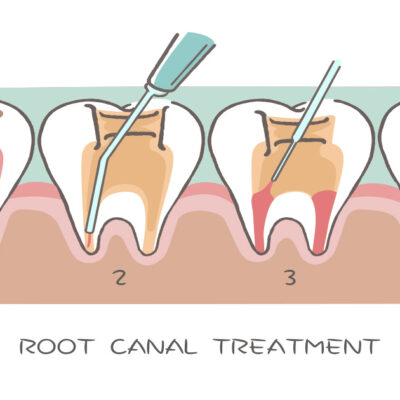No one wants a root canal, but sometimes it is the only option to save a natural tooth. Even though root canals are often associated with horrible pain and dreadful experiences, that is often a misconception. What one feels during the procedure is similar to other dental procedures and usually causes little to no pain.
Why get a Root Canal?
Damage to the nerve of a tooth may occur as a result of several different problems. One of the most common problems that can lead to nerve damage and tooth pain is a large cavity. Trauma to a tooth from an accident or normal wear and tear is another common reason a nerve may become damaged. Once nerve damage occurs, it is common to experience severe tooth pain. The tooth then goes through a process of the nerve dying where the pain may actually subside but then lead to dental abscess or infection. Once an infection begins inside the tooth, a standard root canal procedure will need to take place to protect the tooth’s integrity and keep the mouth healthy.
Pain can be complex. Not all tooth pain means you need a root canal. It’s important to consult with your dentist to properly diagnose the problem. At Downtown Dental, we thoroughly perform a series of x-rays and diagnostic tests to ensure we know the source of the problem.
What is a Root Canal?
If we determine standard root canal treatment is needed, local anesthetic is used to ensure that your tooth is completely numb. Sometimes an antibiotic will be prescribed before root canal treatment is started. Next we focus on disinfecting the root canal system in your tooth. The canal of the tooth is then shaped and sealed with filling material. To ensure long term stability of the tooth a final filling or crown is then placed. This may require multiple visits to complete the treatment, depending on the complexity of the situation. The goal is to rid your mouth of infection and keep your natural tooth.
What are the signs I may need a Root Canal?
- A throbbing toothache that radiates without being stimulated by eating or drinking
- Facial swelling or swelling around a tooth
- Sensitivity to extreme temperatures with lingering pain once the stimulus is removed
- Sharp pain when chewing and biting
Tooth pain that becomes severe enough where it interferes with normal functions will likely prompt the need for urgent dental evaluation.
Our team is well experienced in performing root canals and helping you manage pain associated with your teeth. In some cases a tooth may require more complex treatment where we would refer you to a local root canal specialist, or endodontist, to complete the treatment you need.
Due to its complexity root canal treatment can be costly. However, in some cases the consequence of not saving a tooth with root canal treatment can prove to be more costly in the future. We will help guide you through the decision-making process as we present treatment options that are within your budget and that make sense for the long term health of your mouth. If you have questions or would like to schedule an appointment to discuss your possible need of a root canal, contact us today.

